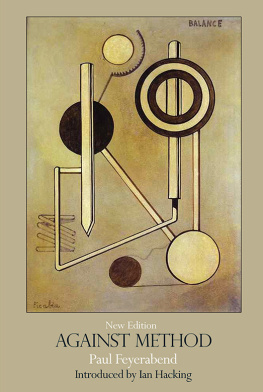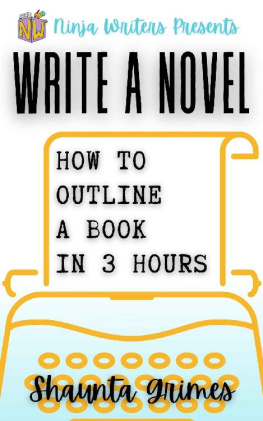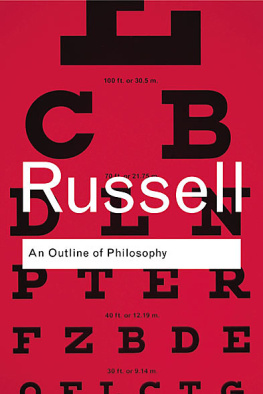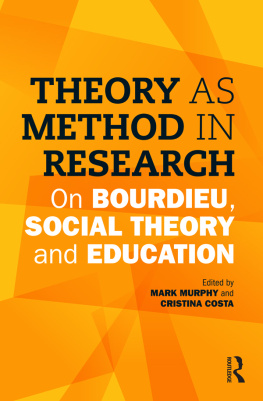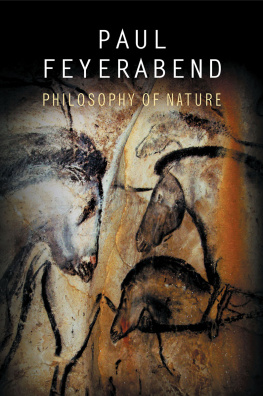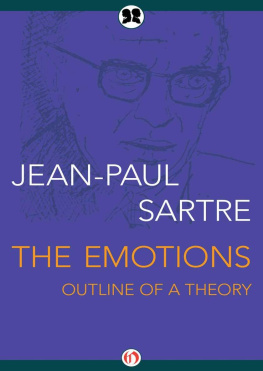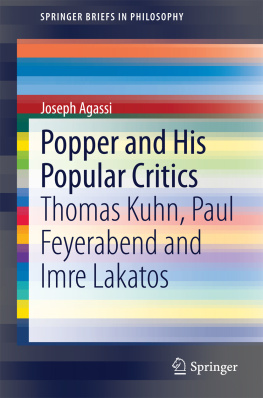Paul Feyerabend - Against Method: Outline of an Anarchistic Theory of Knowledge
Here you can read online Paul Feyerabend - Against Method: Outline of an Anarchistic Theory of Knowledge full text of the book (entire story) in english for free. Download pdf and epub, get meaning, cover and reviews about this ebook. year: 1993, publisher: Verso, genre: Politics. Description of the work, (preface) as well as reviews are available. Best literature library LitArk.com created for fans of good reading and offers a wide selection of genres:
Romance novel
Science fiction
Adventure
Detective
Science
History
Home and family
Prose
Art
Politics
Computer
Non-fiction
Religion
Business
Children
Humor
Choose a favorite category and find really read worthwhile books. Enjoy immersion in the world of imagination, feel the emotions of the characters or learn something new for yourself, make an fascinating discovery.

- Book:Against Method: Outline of an Anarchistic Theory of Knowledge
- Author:
- Publisher:Verso
- Genre:
- Year:1993
- Rating:3 / 5
- Favourites:Add to favourites
- Your mark:
- 60
- 1
- 2
- 3
- 4
- 5
Against Method: Outline of an Anarchistic Theory of Knowledge: summary, description and annotation
We offer to read an annotation, description, summary or preface (depends on what the author of the book "Against Method: Outline of an Anarchistic Theory of Knowledge" wrote himself). If you haven't found the necessary information about the book — write in the comments, we will try to find it.
Against Method: Outline of an Anarchistic Theory of Knowledge — read online for free the complete book (whole text) full work
Below is the text of the book, divided by pages. System saving the place of the last page read, allows you to conveniently read the book "Against Method: Outline of an Anarchistic Theory of Knowledge" online for free, without having to search again every time where you left off. Put a bookmark, and you can go to the page where you finished reading at any time.
Font size:
Interval:
Bookmark:
In 1970 Imre Lakatos, one of the best friends I ever had, cornered meat a party. Paul, he said, you have such strange ideas. Why dont youwrite them down? I shall write a reply, we publish the whole thing andI promise you - we shall have lots of fun. I liked the suggestion andstarted working. The manuscript of my part of the book was finishedin 1972 and I sent it to London. There it disappeared under rathermysterious circumstances. Imre Lakatos, who loved dramaticgestures, notified Interpol and, indeed, Interpol found my manuscriptand returned it to me. I reread it and made some final changes.In February 1974, only a few weeks after I had finished my revision, Iwas informed of Imres death. I published my part of our commonenterprise without his response. A year later I published a secondvolume, Science in a Free Society, containing additional material andreplies to criticism.
This history explains the form of the book. It is not a systematictreatise; it is a letter to a friend and addresses his idiosyncrasies. Forexample, Imre Lakatos was a rationalist, hence rationalism plays alarge role in the book. He also admired Popper and therefore Popperoccurs much more frequently than his objective importance wouldwarrant. Imre Lakatos, somewhat jokingly, called me an anarchistand I had no objection to putting on the anarchists mask. Finally,Imre Lakatos loved to embarrass serious opponents with jokes andirony and so I, too, occasionally wrote in a rather ironical vein. Anexample is the end of Chapter 1: anything goes is not a principle Ihold - I do not think that principles can be used and fruitfullydiscussed outside the concrete research situation they are supposedto affect - but the terrified exclamation of a rationalist who takes acloser look at history. Reading the many thorough, serious,longwinded and thoroughly misguided criticisms I received afterpublication of the first English edition I often recalled my exchangeswith Imre; how we would both have laughed had we been able to readthese effusions together.
The new edition merges parts of Against Method with excerpts fromScience in a Free Society. I have omitted material no longer of interest,added a chapter on the trial of Galileo and a chapter on the notion ofreality that seems to be required by the fact that knowledge is part of acomplex historical process, eliminated mistakes, shortened theargument wherever possible and freed it from some of its earlieridiosyncrasies. Again I want to make two points: first, that science canstand on its own feet and does not need any help from rationalists,secular humanists, Marxists and similar religious movements; and,secondly, that non-scientific cultures, procedures and assumptionscan also stand on their own feet and should be allowed to do so, if thisis the wish of their representatives. Science must be protected fromideologies; and societies, especially democratic societies, must beprotected from science. This does not mean that scientists cannotprofit from a philosophical education and that humanity has not andnever will profit from the sciences. However, the profits should notbe imposed; they should be examined and freely accepted by theparties of the exchange. In a democracy scientific institutions,research programmes, and suggestions must therefore be subjectedto public control, there must be a separation of state and science justas there is a separation between state and religious institutions, andscience should be taught as one view among many and not as the oneand only road to truth and reality. There is nothing in the nature ofscience that excludes such institutional arrangements or shows thatthey are liable to lead to disaster.
None of the ideas that underlie my argument is new. Myinterpretation of scientific knowledge, for example, was a triviality forphysicists like Mach, Boltzmann, Einstein and Bohr. But the ideasof these great thinkers were distorted beyond recognition by the rodentsof neopositivism and the competing rodents of the church of criticalrationalism. Lakatos was, after Kuhn, one of the few thinkers whonoticed the discrepancy and tried to eliminate it by means of acomplex and very interesting theory of rationality. I dont think he hassucceeded in this. But the attempt was worth the effort; it has led tointeresting results in the history of science and to new insights intothe limits of reason. I therefore dedicate also this second, alreadymuch more lonely version of our common work to his memory.
Earlier material relating to the problems in this book is nowcollected in my Philosophical Papers. containshistorical material, especially from the early history of rationalism inthe West and applications to the problems of today.
Berkley, September 1987
{Preface, 1} 2 vols, Cambridge, 1981.
{Preface, 2} London, 1987.
Many things have happened since I first published Against Method(AM for short). There have been dramatic political, social andecological changes. Freedom has increased - but it has broughthunger, insecurity, nationalistic tensions, wars and straightforwardmurder. World leaders have met to deal with the deterioration of ourresources; as is their habit, they have made speeches and signedagreements. The agreements are far from satisfactory; some of themare a sham. However, at least verbally, the environment has become aworld-wide concern. Physicians, developmental agents, priestsworking with the poor and disadvantaged have realized that thesepeople know more about their condition than a belief in the universalexcellence of science or organized religion had assumed and theyhave changed their actions and their ideas accordingly (liberationtheology; primary environmental care, etc.). Many intellectuals haveadapted what they have learned at universities and special schools tomake their knowledge more efficient and more humane.
On a more academic level historians (of science, of culture) have started approaching the past in its own terms. Already in 1933, in his inaugural lecture at the Collge de France, Lucien Febvre had ridiculed writers who, sitting at their desks, behind mountains of paper, having closed and covered their windows, made profound judgements about the life of landholders, peasants and farmhands. In a narrow field historians of science tried to reconstruct the distant and the more immediate past without distorting it by modern beliefs about truth (fact) and rationality. Philosophers then concluded that the various forms of rationalism that had offered their services had not only produced chimaeras but would have damaged the sciences had they been adopted as guides. Here Kuhns masterpiece played a decisive role.
Examples of the new approach are Andrew Pickering, Constructing Quarks, Peter Galison, How Experiments End, Martin Rudwick, The Great Devonian Controversy, Arthur Fine, The Shaky Game and others. and, yes, Imre Lakatos, who was sufficiently optimistic to believe that history herself - a lady he took very seriously - offered simple rules of theory evaluation.
In sociology the attention to detail has led to a situation where the problem is no longer why and how science changes but how it keeps together. Philosophers, philosophers of biology especially, suspected for some time that there is not one entity science with clearly defined principles but that science contains a great variety of (high-level theoretical, phenomenological, experimental) approaches and that even a particular science such as physics is but a scattered collection of subjects (elasticity, hydrodynamics, rheology, thermodynamics, etc., etc.) each one containing contrary tendencies (example: Prandtl vs Helmholtz, Kelvin, Lamb, Rayleigh; Truesdell vs Prandtl; Birkhoff vs physical commonsense; Kinsman illustrating all trends - in hydrodynamics). For some authors this is not only a fact; it is also desirable.
Font size:
Interval:
Bookmark:
Similar books «Against Method: Outline of an Anarchistic Theory of Knowledge»
Look at similar books to Against Method: Outline of an Anarchistic Theory of Knowledge. We have selected literature similar in name and meaning in the hope of providing readers with more options to find new, interesting, not yet read works.
Discussion, reviews of the book Against Method: Outline of an Anarchistic Theory of Knowledge and just readers' own opinions. Leave your comments, write what you think about the work, its meaning or the main characters. Specify what exactly you liked and what you didn't like, and why you think so.

